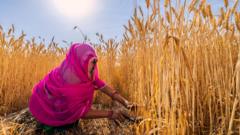The early arrival of summer heat in India is causing significant disruptions in agriculture and manufacturing, impacting yields and sales while raising concerns over economic stability.
India Faces Economic Threats as Summer Heat Hits Farms and Factories Early

India Faces Economic Threats as Summer Heat Hits Farms and Factories Early
As rising temperatures disrupt traditional crop cycles and manufacturing schedules, Indian farmers and businesses grapple with a challenging future.
Early summer could spell trouble for India's farms and factories.
In Ludhiana, a textile city in northwestern India, Nitin Goel's family clothing business, operational for over 50 years, is struggling due to an unusually early summer. "The winter is effectively shorter each year, forcing us to pivot from our traditional sweaters and jackets to t-shirts," he stated. The onset of heat has halved his sales, and gone further down by 10% this season. This unexpected shift mirrors broader anxieties across the nation, where farmers and factory owners are also feeling the strain.
With the Indian Meteorological Department declaring February the hottest in 125 years, rising temperatures have put winter clothing manufacturers on edge. Goel revealed that retailers are reluctant to honor pre-agreed orders amid soaring temperatures, further complicating already delicate market dynamics. Instead of the past practice of straightforward delivery payments, retailers are shifting to a "sale or return" model, jeopardizing manufacturers' financial stability.
Similarly, across India's western coast in Devgad, farmers like Vidyadhar Joshi are dealing with devastating effects on Alphonso mango orchards, with predictions indicating a mere 30% yield compared to normal. Joshi notes, "We may face significant losses this year," as he spends more on irrigation and fertilizers to salvage what remains of his crop.
The threat extends beyond specialty fruits; staple crops like wheat are also vulnerable to the rising heat. While agriculture ministers remain optimistic about a bumper wheat harvest, experts warn of dire predictions resembling last year’s heat-induced losses, which saw a 15-25% drop in yields.
Worsening conditions have also raised alarm over water availability for agriculture, with reservoir levels plummeting from 37% to just 28%. This shortage could hinder the production of fruits, vegetables, and dairy expansion, jeopardizing food prices and threatening inflation as India seeks to stabilize its economy.
Currently, rural consumption in India supports its GDP, but any disruption tied to agricultural production could lead to broader economic instability, especially as urban households begin to reduce their spending. Think tanks advocate for urgent measures, including enhanced weather forecasting and adaptive agricultural practices, to mitigate the impact of recurring heatwaves.
With approximately 75% of Indian districts classified as 'extreme event hotspots,' the risks associated with climate change are becoming increasingly clear. The potential loss in working hours due to heat stress could total 5.8% by 2030, with economic consequences estimated at $159 billion. Without immediate and effective strategies, India risks not only agricultural and economic downturns but also the health and stability of its population.


















